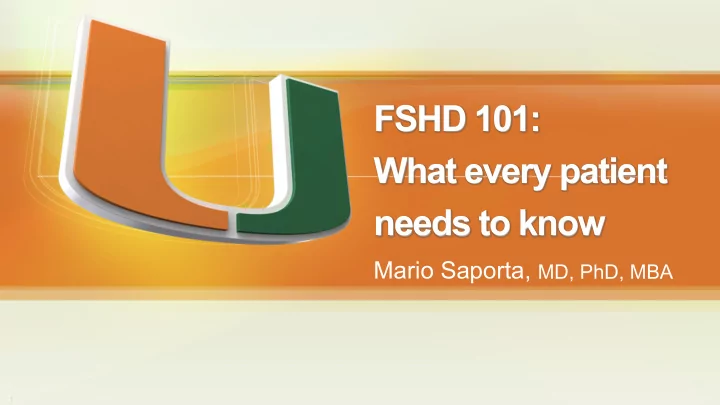

FSHD 101: What every patient needs to know Mario Saporta, MD, PhD, MBA 1
FSHD 101 FSHD is a muscular dystrophy Biology of FSHD Clinical presentation What to monitor Genetics and Risk estimation Management 2
FSHD is a muscular dystrophy 3
Clinical Presentation F – Facio - Face S – Scapulo - Shoulder H – Humeral - Arm 4
Clinical Presentation § One of the most common muscular dystrophies (2 – 7 per 100,000) § Approximately 21,000 in the USA § Can be diagnosed at any age § High degree of variability § Asymmetry § Two clinically identical forms § FSHD type 1: 95% § FSHD type 2: 5% § Chronic shoulder and neck pain 5
Biology of FSHD 6
DUX4 expression in adult muscles D4Z4 contractions (1-10 repeats) DUX4 expression Loss of methylation of D4Z4 Chromatin opening in muscle 4q polymorphism A SMCHD1 + mutation 7
What to monitor 8
What to monitor § Respiratory involvement: Present in <10% of patients § Pulmonary function testing and sleep studies § Cardiac involvement: <5% of patients § Mostly asymptomatic arrhythmia. ECG § Retina disease (Coats syndrome): <1% of patients § Vascular changes leading to retinal detachment and vision loss. Annual ophthalmology evaluation § High frequency hearing loss: approx. 16% of patients § Mild and usually asymptomatic. Audiometry. § These complications are usually present only in FSHD type 1 patients with large deletions 9
Genetics and Risk Estimation 10
ESTIMATING RISK IN GENETIC CONDITIONS
HOW DO WE INHERIT OUR LIBRARY OF GENES? 12
Autosomal Dominant § FSHD type 1 § Mutation in one copy is enough to cause disease § Risk for passing disease on is 50% § Risk does not depend on gender § Up to 30% of cases are new, spontaneous mutations 13
Guidelines for the treatment of FSHD § Multidisciplinary care § Stretching and rage of motion exercises § Assistive devices (braces, mobility) § Respiratory evalution § Dilated eye exame § Pain management § Scapular fixation? 14
QUESTIONS? 15
Recommend
More recommend